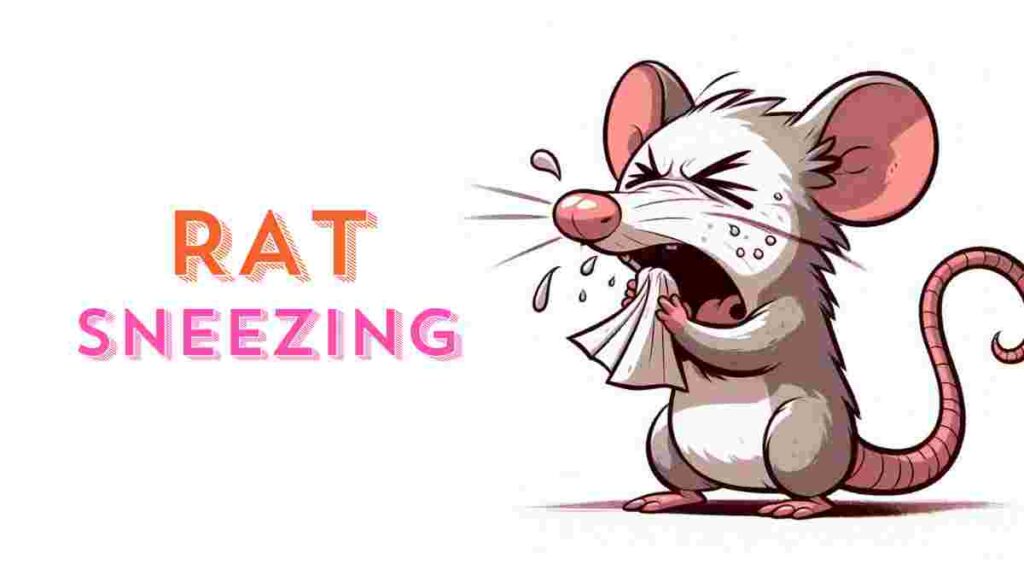Discover everything you need to know about rat sneezing in this comprehensive guide. Learn about the causes, symptoms, and treatments for this common issue among pet rats.
Perfectly Balanced Food For Your Rat
Find the best home for your rodent friend

Table of Contents
Introduction
Welcome to the ultimate guide on rat sneezing! If you’re a rat owner, you may have observed your furry friend sneezing from time to time, and you’re not alone in wondering what it means. In this article, we’ll delve deep into the world of rat sneezing, exploring its causes, potential health implications, and how to address this concern. Whether you’re a seasoned rat owner or considering adopting these adorable pets, understanding rat sneezing is essential for their well-being and your peace of mind.
Understanding Rat’s Sneezing
Rat sneezing, while common, can raise concerns among pet owners. Here, we’ll explore the various aspects of this behavior and what it entails for your furry companions.
The Physiology of Rat’s Sneezing
Rat sneezing is a natural physiological response that serves to expel irritants or foreign particles from the respiratory system. Similar to humans, rats have sensitive respiratory systems, making them prone to sneezing when exposed to dust, allergens, or other airborne pollutants.
Common Causes of Rat Sneezing
There are several reasons why your pet rat may be sneezing, ranging from environmental factors to underlying health issues. Let’s explore some of the common triggers of rat sneezing:
- Environmental Factors: Dust, pollen, smoke, and other airborne particles can trigger sneezing in rats.
- Allergies: Just like humans, rats can develop allergies to certain substances, leading to sneezing fits.
- Respiratory Infections: Bacterial or viral infections such as mycoplasma or pneumonia can cause sneezing and other respiratory symptoms in rats.

Symptoms of Rat Sneezing
Identifying the symptoms associated with rat sneezing is crucial for determining whether your pet requires medical attention. Here are some signs to watch out for:
- Frequent Sneezing: Occasional sneezing is normal, but if your rat is sneezing excessively, it could indicate an underlying issue.
- Nasal Discharge: If you notice any discharge from your rat’s nose, particularly if it’s discolored or bloody, it may signify an infection.
- Labored Breathing: Difficulty breathing or wheezing could be indicative of a more serious respiratory condition.
Treatment and Prevention
Now that we’ve explored the causes and symptoms of rat sneezing, let’s discuss how to manage this issue and prevent it from recurring:
- Maintain a Clean Environment: Regularly clean your rat’s cage and bedding to minimize exposure to dust and allergens.
- Monitor Respiratory Health: Keep a close eye on your rat’s respiratory health and seek veterinary care if you notice any concerning symptoms.
- Provide Proper Ventilation: Ensure that your rat’s living space is well-ventilated to prevent the buildup of airborne irritants.

Frequently Asked Questions (FAQ)
Can rat sneezing be a sign of a serious health problem?
While occasional sneezing is normal, persistent or severe sneezing could indicate an underlying respiratory issue that requires veterinary attention.
How can I alleviate my rat’s sneezing?
Maintaining a clean living environment and minimizing exposure to potential allergens can help reduce sneezing episodes in rats.
Is rat sneezing contagious to humans or other pets?
In most cases, rat sneezing is not contagious to humans or other pets. However, if your rat is diagnosed with a respiratory infection, it’s essential to practice good hygiene to prevent transmission.
Should I be concerned if my rat sneezes occasionally?
Occasional sneezing is normal and may not be cause for concern. However, if you notice any accompanying symptoms such as nasal discharge or labored breathing, it’s best to consult with a veterinarian.
Can rats develop allergies like humans?
Yes, rats can develop allergies to various substances, including dust, pollen, and certain types of bedding. Identifying and eliminating potential allergens can help alleviate sneezing in allergic rats.
What should I do if my rat’s sneezing persists despite preventive measures?
If your rat’s sneezing continues despite efforts to minimize environmental triggers, consult with a veterinarian for a thorough evaluation and appropriate treatment.
Conclusion
In conclusion, rat sneezing is a common occurrence among pet rats and is often a natural response to environmental irritants. By understanding the causes, symptoms, and preventive measures associated with rat sneezing, you can ensure the health and well-being of your furry companions. Remember to maintain a clean living environment, monitor your rat’s respiratory health, and seek veterinary care if needed. With proper care and attention, you can help your rats lead happy, healthy lives free from sneezing woes.
